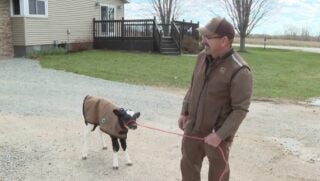A Vermont family farm is building the largest digester in the state to produce Renewable Natural Gas from cow manure and food waste to fuel a local college.
Middlebury College will significantly reduce its carbon footprint thanks to an innovative partnership with Goodrich Family Farm in Salisbury, Vermont; Vanguard Renewables of Wellesley, Massachusetts; and Vermont Gas.
Under the terms of a recently signed agreement, Vanguard Renewables will construct, own, and operate a facility at Goodrich Family Farm that will combine cow manure and food waste to produce Renewable Natural Gas (RNG). Gas produced by the Farm Powered anaerobic digester will travel by pipeline to Middlebury College’s main power plant. Middlebury has agreed to purchase the bulk of the facility’s output.
“We are constantly looking at new ways to make our energy sources more sustainable and diverse, and the digester project is a great opportunity to do that,” said David Provost, executive vice president for finance and administration at Middlebury College. “In 2016, the College reached its goal of carbon neutrality. We want to maintain that goal and keep improving on it. The digester will enable us to further decrease our use of carbon-based fuels.
Beyond the renewable energy produced by the digester, the facility will create high-quality, liquid fertilizer that will reduce the farm’s reliance on chemical fertilizers. The farm will also benefit from lower energy costs, free heat for farm use, fewer greenhouse gas emissions, and an annual lease payment for hosting the anaerobic digester facility. Located on more than 2,200 acres, the Goodrich Family Farm is a generational dairy farm with 900 milking cows.
“The digester offers help with many of the challenges we face as farmers,” said Chase Goodrich, who is among the fourth generation of his family to operate the farm. “We want to diversify our income sources and find new ways to be environmentally friendly. Here in the Champlain Valley, we’re particularly aware of efforts to reduce phosphorus runoff into Lake Champlain.”
The Goodrich Family Farm anaerobic digester will produce the largest amount of energy or RNG of any digester in Vermont. It will process 100 tons of manure from the farm and 165 tons of organic food waste per day. Vanguard plans to source the organic food waste from local and Vermont-based food manufacturers including Cabot Creamery.
The Goodrich Farm digester will produce 140,000 Mcf per year. (A Mcf is 1,000 cubic feet of Renewable Natural Gas.) The College will buy 100,000 Mcf of the gas from Vanguard and Vermont Gas will purchase the remainder.
Once the digester is operating, the College will use oil at its heating plant only as a back-up energy source during extreme cold weather or other emergency situations.
“We’re especially excited about this project because it’s our first partnership with a college and our first digester in Vermont,” said John Hanselman, executive chairman of Vanguard. “Middlebury College, Goodrich Farm, and Vermont Gas are setting a new example that can be replicated across the country.”


